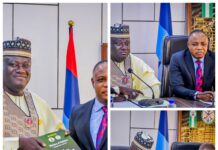…..NBS must be protected from political interference
Rep. Isiaka Ibrahim, House Committee Chairman on National Planning and Economic Affairs, says the National Bureau of Statistics(NBS) needs to be insulated from political interference to perform more effectively.
Ibrahim said this at a Public Lecture to mark the 2023 African Statistics Day celebration in Abuja on Wednesday.
Read Also: Politics of Statistics in Nigeria by Dakuku Peterside
The News Agency of Nigeria(NAN) reports that the theme of the 2023 African Statistics Day was “Modernising Data Ecosystems to Accelerate the Implementation of the AfCFTA: The Role of Official Statistics and Big Data in the Economic Transformation and Sustainable Development of Africa”
He said the reliability of data from the NBS would be questioned if there was any form of political interference.
“Statistics forms the adjustable shock absorber of any government, be it at the local, state and federal level.
“Any government that is not taking what we are talking about today so seriously is only going to succeed in handing poverty to its citizens.
” We need to insulate the NBS from any political interference, because once whatever the whole world wants to rely on is subjected to alteration through political interference, the reliability will be in doubt.
“But once you are insulated through the backing of the law, definitely everyone will be encouraged to do his or her job effectively and efficiently,” he said.
Sen. Abdullahi Yahaya, Senate Committee Chairman on National Planning and Economic Affairs, said Nigeria had many challenges which included poverty, inflation and accumulation of debts.
Read Also: Customs CG Affirms Nigeria Customs Transformation With AfCFTA Objectives
Yahaya said that the NBS needed to provide reliable data to convince the executive and legislature of ways to address some of these challenges.
He assured the NBS that the National Assembly would ensure the bureau gets the needed resources to obtain accurate data to help banish poverty in Nigeria.
“We will look into your challenges and give you the necessary tools you need to provide the needed reliable information to address these challenges,” he said
Segun Awolowo, Secretary, National Action Committee on AfCFTA, spoke on “The Role of Statistics and Big Data in the Economic Transformation and Sustainable Development”.
Awolowo, represented by Zakari Jimeta, Sensitisation/Communications Coordinator, National Action Committee Secretariat, AfCFTA, said AfCFTA stood to gain numerous benefits from harnessing the power of big data.
He said the benefits included informed decision-making, enhanced market intelligence, financial inclusion and access, and supply chain optimisation.
Others he said included customs and border management, targeted investment, sustainable development and public health and safety.
He gave some recommendations for harnessing the power of big data in AfCFTA implementation to include investment in data infrastructure
“To fully capitalise on the potential of big data, African nations must prioritise investment in robust data infrastructure. This includes enhancing data collection mechanisms, ensuring data security, and establishing interoperable systems.
“Governments should collaborate with private sector entities to build a comprehensive and standardised data infrastructure that facilitates seamless data exchange among member countries.
“By doing so, we pave the way for a unified and interconnected data ecosystem that supports the objectives of AfCFTA.”
Awolowo said another recommendation was the need for capacity building and skills development, saying the successful implementation of big data initiatives requires a skilled workforce.
“Governments and organisations should invest in training programmes and capacity-building initiatives to equip professionals with the necessary skills in data analytics, artificial intelligence, and other relevant technologies.
“This investment not only empowers individuals but also strengthens the overall data ecosystem, ensuring that member countries have the expertise to leverage big data effectively for AfCFTA implementation.”
Read Also: Corruption Greatest challenge to Nigeria’s growth – Magu
Awolowo said another recommendation was to promote data sharing and collaboration, adding that data silos could hinder the comprehensive understanding of economic trends and trade dynamics.
According to him, the implementation of AfCFTA demanded a paradigm shift in our approach to data.
Awolowo said the combination of official statistics and big data created a powerful synergy that amplified Africa’s capacity to navigate the complexities of a rapidly evolving economic landscape.
“As we modernise our data ecosystems, we lay the foundation for a more resilient, responsive, and sustainable Africa.
“Let us seize the opportunities presented by big data, leveraging its impressiveness to propel AfCFTA towards unprecedented success.
Average price of 5kg cooking gas stood at N4,562.51 in October – NBS(Opens in a new browser tab)
“By doing so, we not only embrace the digital age but also pave the way for a united and prosperous Africa that stands as a beacon of economic transformation and sustainable development.
” Big data and the AfCFTA should be seen as the biggest tools to position Nigeria as the main driver of the AfCFTA in Africa and I believe major steps have been taken towards achieving that today, ” he said.
NAN reports that the African Statistics Day is an annual event celebrated on Nov. 18 to raise public awareness of the importance of statistics in all aspects of social and economic life. (NAN)




